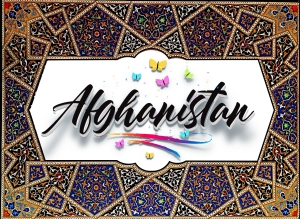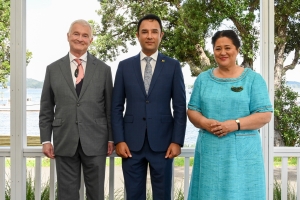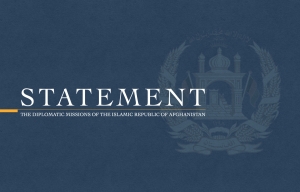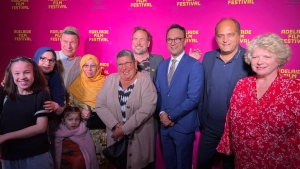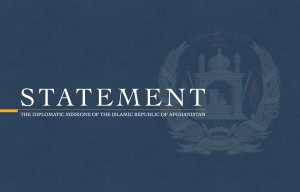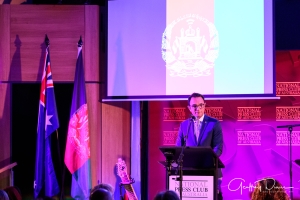From Friday 17 to 19 February 2023, Canberra will be celebrating the 25th anniversary of the National Multicultural Festival. This iconic event is Australia’s largest celebration of cultural diversity with it's more than 170 unique nationalities, featuring music, dance, food, and art from around the world. The festival is an opportunity for people from different cultural backgrounds to come together, share their traditions, and showcase their unique contributions to Australian society.
The Embassy of Islamic Republic of Afghanistan together with the ACT Afghan community have chosen to participate in the National Multicultural Festival this weekend to share the rich cultural heritage of Afghanistan with the wider Australian community. Despite the challenges faced by Afghanistan, the country has a long and proud history of art, music, and dance that is little known outside the region. By participating in the festival, the Embassy hopes to raise awareness of Afghanistan's unique cultural contributions and to foster greater understanding and appreciation of the country's rich cultural heritage.
The Embassy of Afghanistan and Afghan community's participation in the festival will be a celebration of the country's diverse culture, featuring a variety of traditional music, dance, and art. Visitors to the festival can expect to experience the vibrant colors and sounds of Afghanistan through the performances of skilled musicians, dancers, and artists. They can also learn more about the country's unique cultural traditions through interactive displays and exhibitions.
The festival promises to be an exciting and enriching experience for all who attend, celebrating the many diverse cultures that make up the Australian community.
IMPORTANT DATES AND TIMES:
The Embassy of I. R. of Afghanistan will showcase Afghan art and culture for raising awareness and cultural understanding.
Time: 19 February 2023, From 10 AM to 5 PM
Location: Section C - Stall C12, Petrie Plaza
Afghan Fold Music:
Performing traditional Afghan folk music.
Time: 17 February 2023 6.20pm
Location: Section F - Garema Place Stage
Attan and Qarsak - Afghan Showcase:
The Canberra Afghan Community will bring traditional Afghan musicians to play Afghan music for Canberra! Yes, Afghan music and traditional dance for the first time in the history of this beautiful multicultural festival! Don’t miss out this to see our live performance.
A group of performers will come on the stage to perform the traditional “Attan” dance (performed by a group). The second performance will be another traditional group dance called “Qarsak” and will be performed by traditional performers.
Time: 18 February 2023 10.00am
Location: Section B - Ainslie Place Stage
Musical Performance:
Abbas Neshat is a well known musician from Afghanistan and he is also a singer, songwriter, and composer.
Abbas was a co-star in AfghanStar a singing competition and managed to get to top singers of the year.
His songs are very popular among Afghan people. Specifically his songs with Dambura (Afghan instrument) singing with Ghazal is just amazing.
Time: 19 February 2023 12.30pm
Location: Section D - Akuna Street Stage
For more details, please visit https://www.multiculturalfestival.com.au/festival-program
Stay tuned and enjoy!
The ambassador of Afghanistan, His Excellency Wahidullah Waissi, had recently visited New Zealand to celebrate Waitangi Day, marking the signing of the Treaty of Waitangi between the British Crown and Maori chiefs in 1840. During the visit, the ambassador had the honor of meeting with the Governor General at the Diplomatic Luncheon at Russell and the Prime Minister of New Zealand at the Waitangi ground.
The Ambassador discussed current affairs of Afghanistan and dire situation of Afghans, especially girls and women, under the rule of the Taliban. The Governor General of New Zealand expressed her solidarity with the people of Afghanistan during this challenging time. The ambassador emphasised his hope for continued collaboration and friendship between people of Afghanistan and New Zealand, and the importance of cultural exchange and understanding.
Ambassador Waissi also called on Hon Andrew Bayly, member of parliament and co-chair of Afghanistan's Friendship group at the New Zealand Parliament. Ambassador Waissi has briefed the MP about the situation of human rights, girls education, regional security and Afghans in diaspora. The friendship group of Afghanistan at the NZ parliament was established in March 2020. The group has 12 member MPs.
In addition to his official meetings, the ambassador also took the opportunity to engage with the Afghan community in Auckland city, New Zealand. The Afghan community in New Zealand has grown significantly in recent years and continues to thrive, making significant contributions to the country in various fields. The ambassador was impressed by the passion and dedication of the Afghan community, and expressed his support for their continued growth and success in New Zealand. To date, more than 20 thousands Afghans chose to live in New Zealand since 70s of last century. The New Zealand government has managed to evacuate couple of thousands of Afghans since August 2021.
The ambassador's visit was a testament to the strong and growing relationship between Afghanistan people and New Zealand, and the efforts being made to promote cultural exchange and understanding between the people of two nations. It was an important opportunity for the ambassador to represent the Afghan people and engage with key leaders and members of the Afghan community in New Zealand.
Statement of the Diplomatic Missions of the Islamic Republic of Afghanistanon the International Day of Education
Canberra, 24 January 2023 - On the International Day of Education, we express once again our deep concern over the Taliban’s continued repressive and discriminatory policies aimed at erasing women and girls from public life which continues to have a devastating impact on Afghan society and economy.
We appreciate the ongoing efforts and campaigns under UNESCO in support of education for women and girls worldwide and extend our deep gratitude for dedicating the 2023 International Day of Education to Afghan girls and women, highlighting one of the main global crises of our time.
Since the occupation of Afghanistan by the Taliban, Afghan women and girls have been deprived of their fundamental right of access to education beyond the elementary level as part of the Taliban’s gender-based discrimination policy which is a gross violation of both the Universal Declaration of Human Rights and the Islamic Declaration of Human Rights.
From 2001 to 2021, the contributions of UNESCO and the international community to Afghanistan’s education sector resulted in an unprecedented increase in the number of girls in primary education from almost zero to 2.5 million. This marked an increase from 5000 women in higher education to more than 100,000 and an increase in women's literacy rate from 17% to 30%. Most tragically, the Taliban have been reversing these and other important gains achieved through joint efforts and sacrifices of the people of Afghanistan and our international partners in the area of women’s empowerment and other fields.
Currently, more than 80% of school-aged girls and women in Afghanistan are deprived of their universal human right access to education. Rejecting all national and international appeals, the Taliban do not allow women to peruse their aspirations, to have a role in society, and more broadly, to have a future. Their discriminatory policies constitute a war of deprivation against Afghan women and girls and apparently a war against the future generations of Afghanistan. We see with great admiration how courageous Afghan girls and women, despite all these challenges, resist these medieval and draconian policies by protesting on the streets and resorting to secret self-education. As they continue their fight for their fundamental rights and put their lives at risk, we all must support them with all the possible means at our disposal, in their great and heroic struggle for their rights and freedom.
The International Day of Education celebrates the role of education in peace and security. As this year’s theme focuses on maintaining strong political mobilization around education and charting the way to translate commitments and global initiatives into action, we urge the international community to 1) help restore and uphold the fundamental rights of all Afghan citizens particularly women and girls, 2) prioritize access to education of Afghan women and girls on their agenda, and 3) develop and implement pragmatic, innovative and effective actions and programs based on best practices in this regard. On this occasion, we also once again join all national and international appeals calling for the immediate release of all the courageous Afghan women’s rights activists and protestors who have been forcibly detained by the Taliban.
After former Afghan refugee and photographer, Muzafar Ali, discovers that Afghans have been an integral part of Australia for over 160 years, he begins to photograph their descendants in a search to define his own Afghan-Australian identity. The Cameleer Descendants are a mix of Aboriginal, Afghan and Colonial Australian and as Muzafar meets and connects with the resilient but traumatised community he learns about his new country’s complicated history. His journey is interrupted when Afghanistan is handed back to the Taliban by the US and International Forces, and he races to help his friends and colleagues left behind.
The Watandar, My Countryman Red Carpet Gala and World Premiere screening was held at the Palace Nova Eastend Cinemas. Ambassador Wahidullah Waissi together with the South Australia's Minister for Small and Family Business, Consumer and Business Affairs and the Arts, Andrea Michaels MP. The event had quite unique number of Afghan Cameleers descendants from different walks of South Australia.
Watandar, My Countryman was directed by Jolyan Hoff and produced by Muzafar Ali.
Muzafar Ali is a photographer and human rights activist from Afghanistan. He is director of a refugee-led education program in Indonesia and Thailand. Currently based in South Australia, Ali is studying at the University of South Australia and is an advocate for refugee rights and agency and speaks out on behalf of refugees ‘stuck in limbo’. He started working for the United Nations in 2005, and bought a camera with his first salary. His UN roles included work in strengthening democracy, rule of law, governance, and security, as well as monitoring human rights.
Visiting the remote areas of the Hazarajat region of Afghanistan, Ali photographed the lives the Hazaras. He became one of the first young Afghan photographers to document his nation’s progress emerging from the ashes of war. His photographs depict the beauty and simplicity of daily life of ordinary Afghans.
Ali’s UN work placed his life in danger. In 2005 the Taliban targeted his car with an Improvised Explosive Device, and he was threatened by local warlords and corrupt government officials. By 2013, Muzafar had become a refugee and journeyed to Indonesia where he co-founded the first refugee-led school in West Java. Muzafar is currently managing the Cisarua Learning program in Australia that funds refugee-led schools in Indonesia and Thailand, providing education to more than 1000 students.
For more information about Watandar, My Countryman, please read: https://documentaryaustralia.com.au/project/watandar-my-countryman/
Sources:
https://www.muzafar.net/about/index
https://adelaidefilmfestival.org/event/watandar-my-countryman/
Shab-e-Yalda or Chella, has been considered as part of UNESCO's Intangible Cultural Heritage (ICH). This was announced on the occasion of the 17th session of the intergovernmental committee for the safeguarding of Intangible Cultural Heritage held in Rabat, Morocco on 29 November 2022. The Islamic Republic of Afghanistan in 2016 made its efforts to nominate Yalda/Chella for the UNESCO's Intangible Cultural Heritage. The process took more than five years to become part of the ICH.
In particular with relation to the 2003 Convention for the Safeguarding of the Intangible Cultural Heritage, Nowruz was inscribed as an element in 2009, and extended in 2016, on the Representative List of the Intangible Cultural Heritage of Humanity, at the joint initiative of Afghanistan, Azerbaijan, India, Iran (Islamic Republic of), Iraq, Kazakhstan, Kyrgyzstan, Pakistan, Tajikistan, Turkey, Turkmenistan and Uzbekistan.
Being part of UNESCO's Intangible Cultural Heritage inscriptions means recognising the country's heritage and its importance in maintaining cultural diversity in the face of increasing globalisation. Intangible Cultural Heritage means helping intercultural dialogue, fostering mutual respect for other ways of life. Its importance lies not in the cultural manifestation itself, but in the wealth of knowledge and skills that are transmitted through it from one generation to another.
Yaldā/Chella refers to a traditional celebration of the sun and the warmth of life and is the longest night in thé solar calendar of Afghanistan that coincides wifh thé Qaus 30th (December 21st) of the Afghan solar calendar. It represents the last night of the autumn and the first day of the winter. This night embodies the victory of light over darkness, that is, the birth of Mitra which is the goddess of sun in the local beliefs. As of this night, days get longer and longer. In Afghanistan, people believe that the devil (Satan) invades houses at this night and they set fire at their houses to prevent entrance of evil and ugliness (embodied as the devil) to their houses.
Families gather at the houses of elders and sit around a table adorned with a series of symbolic objects and foods: a lamp to symbolize light, water to represent cleanliness, and red fruits such as pomegranates, watermelons, beetroots, jujube and grapes to symbolize warmth. Broth, sweets, dried fruits and nuts that are used specifically for the occasion are also set on the table and consumed during the gathering. Activities range from reciting poetry and storytelling to playing games and music and giving gifts to new in-laws, brides and children. The event celebrates cultural identity, nature, respect for women, friendship, hospitality, cultural diversity and peaceful coexistence. It is transmitted informally within families, although radio and television programmes, publications, social media and educational materials have also played an important role in transmitting the practice in recent years. Events, conferences, trainings, workshops and awareness-raising activities carried out by research centres, NGOs, cultural organizations and educational institutes have also had a significant impact on the proper transmission of the element to future generations.
For more information, please visit: https://www.unesco.org/en/articles/new-inscriptions-unesco-intangible-cultural-heritage
On 26 November 2022, UNESCO announced the winners of the Asia-Pacific Awards for Cultural Heritage Conservations. 13 projects from 6 countries – Afghanistan, China, India, Iran, Nepal and Thailand – have been acknowledged for awards by an international jury in this year’s Awards programme. Jury deliberations were carried out in November 2022, when members reviewed a total of 50 entries from 11 countries from across the Asia-Pacific region.
Topdara Stupa, which is located in Charikar of Afghanistan is winner of Award of Merit.
A dome-shaped ancient Buddhist shrine, the Topdara stupa to the north of Kabul was described by 19th century British explorer Charles Masson as “perhaps the most complete and beautiful monument of the kind in these countries.” Since Masson’s visit in 1833, the Topdara stupa saw few visitors and had fallen into neglect until recently, in 2016, when an Afghan cultural heritage organisation began its preservation and excavation work.
For more information about this heritage site, please read: https://www.afghanistan-analysts.org/en/reports/context-culture/the-largest-standing-stupa-in-afghanistan-a-short-history-of-the-buddhist-site-at-topdara/
The 2022 ICC Men's T20 World Cup was the eighth ICC Men's T20 World Cup tournament. It was played in Australia from 16 October to 13 November 2022. Although originally scheduled to be held in 2020, in July 2020, the International Cricket Council (ICC) confirmed that the tournament had been postponed due to the COVID-19 pandemic. In August 2020, the ICC confirmed that Australia would host the rearranged tournament in 2022, while the T20 World Cup would take place in India in 2021 as originally planned, but that was later moved to the United Arab Emirates and Oman. On 21 January 2022, the ICC confirmed all the fixtures for the tournament. Hosts Australia were also the defending champions.
The twelve teams that reached the Super 12 phase of the 2021 ICC Men's T20 World Cup automatically qualified for the 2022 tournament. Afghanistan, Australia, Bangladesh, England, India, Pakistan, New Zealand and South Africa all qualified directly for the Super 12 phase of this tournament, based on their performances in the 2021 tournament and their rankings as of 15 November 2021. Namibia, Scotland, Sri Lanka and the West Indies were all placed in the group stage of the competition.
The Afghanistan squad for T20 World cup 2022 has a 15 member team which includes: Mohammad Nabi (c), Najibullah Zadran (vc), Rahmanullah Gurbaz (wk), Azmatullah Omarzai, Darwish Rasooli, Farid Ahmad Malik, Fazal Haq Farooqi, Hazratullah Zazai, Ibrahim Zadran, Mujeeb ur Rahman, Naveen ul Haq, Qais Ahmad, Rashid Khan, Salim Safi and Usman Ghani.
The first match was with England in Perth stadium. Afghanistan's Ambassador to Australia, His Excellency Wahidullah Waissi, was in Perth to welcome the players on October 22. The second match with New Zealand on October 26 and the third match with Ireland on October 28 were abandaned due to weather condition. The Embassy of Afghansitan also hosted a reception for all Afghan squad and thier coaches in Melbourne on October 27.
Statement of the Diplomatic Missions of the Islamic Republic of Afghanistan on the Joint Communique of the US-Europe Group on Afghanistan of 22 September 2022
The Diplomatic Missions of the Islamic Republic of Afghanistan welcome the Joint Communique of the US-Europe Group on Afghanistan of 22 September 2022.
The statement signified increased recognition of the legitimate and long-standing concerns of the people of Afghanistan about violations of international humanitarian law and international human rights treaties and conventions by the Taliban and their lack of ability and willingness to deliver any notable progress on a set of core issues – including respect for the rights of all Afghans, especially women, girls and minority groups, meeting the humanitarian and economic needs of the people, severing ties with international terrorist groups and accepting truly inclusive and representative governance, as desired and demanded by the people of Afghanistan.
We are pleased that the statement also contains adequate reference to specific measures which are needed to be taken at the international level in support of the rights, dignity and above all, the free will of the people of Afghanistan in relation to their future destiny.
We note with satisfaction the degree of increased international recognition of the fact that the conflict in Afghanistan remains un-resolved; that the need for a credible and inclusive national dialogue leading to constitutional order with a representative and accountable government chosen through a credible process which ensures the active participation of the all eligible citizens of Afghanistan is ever more imperative; and that without a comprehensive political settlement leading to a new, inclusive and representative government, the risk of continued conflict will increase.
We also welcome the emphasis afforded to enhanced measures for increased and improved delivery of international assistance to address the grave humanitarian and economic challenges facing the people of Afghanistan, including by ensuring that all humanitarian staff have unimpeded access to all parts of Afghanistan where assistance is needed and to be provided.
We stand hopeful that the spirit of the Joint Communique will mark the start of more focused and effective international engagement to achieve the noble goal of a truly peaceful, inclusive. stable and prosperous Afghanistan where the rights, honor and dignity of all citizens of our proud nation are ensured and upheld.
We once again thank the international community for its continued commitment to the people of Afghanistan, especially at this most crucial juncture in our nation’s history.
Keynote Message
By HE Wahidullah Waissi
Ambassador of Islamic Republic of Afghanistan to the Commonwealth of Australia
On the occasion of the 103rd Anniversary of Afghanistan’s National Day
20 August 2022
***
In the Name of Allah, the most Compassionate, the most Merciful
I would like to especially thank and acknowledge presence of the Chief of Protocol, Ambassador for Women and Girls, members of the diplomatic corps, veterans, members of the Australian Defence Force, Home Affairs and Department of Foreign Affairs and Trade, fellow members of the Afghan community from Canberra and those who have travelled from all states of Australia to join us tonight.
Good evening and welcome to the Anniversary of Afghanistan’s National Day combined with the beautiful Sparrows of Kabul show, which is an extraordinary and unique performance of Fred Smith and his band.
Tonight, I am really honoured to see friends and supporters of Afghanistan under one roof on this auspicious occasion, setting a milestone in the history of Afghanistan.
Tonight, we are gathered here not only to celebrate the 103rd anniversary of Afghanistan’s reclamation of independence since 1919 but to reflect on the last turbulent year of Afghanistan. A year of sad ending, losses of all gains and our people’s veiled freedom, independence, and shattered dreams.
Dear Participants,
At the outset, please allow me to express my deepest gratitude to the Government and people of Australia for standing in solidarity with the Afghan people, over the last two decades, as they do continue to support, in particular, during the evacuation processes, and for their warmth welcome extended to the Afghan evacuees.
I would like to thank the Australian veterans, the courageous service men and women and the Australian heroic soldiers who have fallen to promote the shared right cause and aspirations. Our hearts and minds remain with the grieved families and friends, for ever.
Also, I would like to thank His Excellency General the Honourable, David Hurley, Governor-General of the Commonwealth of Australia for his comforting words and gracious messages, extended to me and to the people of Afghanistan on the occasion Afghanistan’s National Day.
Australia’s virtuous policy in expressing this great nation’s solidarity with the Afghan people and the sense it delivers, remain invaluable and will be remembered for years to come.
Ladies and Gentlemen,
Exactly, last year around this time, the Taliban’s occupation of Afghanistan, once again put the country into a deep political, economic, social, and humanitarian crisis, and uncertain future. Where it disrupted the hard-won gains achieved through our joint efforts and sacrifices of the Afghans, Australians, and the international community since 2001.
What is certain, and I am sure you share it with me, is that, despite the false and imposed optimism, the Taliban have not changed. The group has re-enacted their draconian policies and directives from the 1990s.
Arbitrary detentions, including of women activists, forced disappearances, collective punishment, media crackdowns, extra-judicial killings, and torture, including of former members of the national security forces and government officials remain normal practices under this militant group. An absolute prevails of fear, trauma, physical and psychological insecurity, that have been forcing hundreds of thousands of vibrant Afghans to leave the country.
Traditionally, the speeches for the national days are more jubilant, eloquent, and progressive. Sadly, it falls short for Afghanistan this time. In June, the UN Security Council reported the Afghan economy had contracted by an estimated 30%-40% since the Taliban takeover in August last year. More than half of the 40 million people of Afghanistan are facing severe malnutrition and grinding poverty, and 90% struggle with food insecurity. Most women are blocked from returning to their places of employment and business, with only 15% of women able to work.
The mass exodus of brain-drain continues and hundreds of thousands of Afghanistan’s best and brightest have already fled the country.
Ladies and Gentlemen,
The Sparrows of Kabul have more stories to share tonight.
Enhancing public and private education, boosting economic development, democratic institutions and political representation, safeguarding human rights, women and girls empowerment, freedom of speech, freedom of press, flourishing arts, culture, music, sport, and all other areas of socio-economic development in Afghanistan have now faced with meaningless impediments and restrictions by the Taliban group due to their mis-interpretation of Islam and the sharia law, which is totally strange and not acceptable by any country and Muslim community throughout the world.
The Sparrows of Kabul witness, that with all these wrongdoings of the Taliban that we know about, even though there are lack of freedom of press and media in Afghanistan, how can be convinced that the Taliban have changed for the better, compared to their repressive totalitarian regime of the 1990s.
Should the Afghan nation and the international community accept the deprivation of millions of Afghan women and girls from their fundamental rights, such as employment and education as a new normal?
Hence, on this occasion, on behalf of my people, I call on the international community and the United Nations to seek pragmatic solutions to the current economic, political and humanitarian crisis in Afghanistan through putting in place all necessary measures to meet the urgent needs of the people of Afghanistan.
Enhancing support for the preservation of the fundamental human rights of the people of Afghanistan, including the protection of the rights of women, girls, minorities and other vulnerable groups is important. Robust international accountability measures should be put in place to deter further human rights, abuse of women’s rights and international humanitarian law violations.
Enhancing humanitarian assistance to meet the urgent lifesaving and life-sustaining needs of the Afghan people is highly recommended.
With the evacuation of Afghanistan’s best and brightest, the investment is assured for Afghanistan’s future. Today’s brain-drains are our tomorrow’s brain-saved
I appreciate the Australian Government, the Australian people and the Afghan diaspora for maintaining their current principled position and supportive role, together with the rest of the world, to the cause and struggle of the people of Afghanistan, particularly women and girls, for staying away of “not recognizing the Taliban” as a government.
The embassy of Afghanistan in Canberra together with the diplomatic missions of the Islamic Republic of Afghanistan around the globe remain firmly committed to meeting the needs of our growing and vibrant diaspora community including by providing continued consular services. We further remain committed to working closely with our host governments, friends of Afghanistan, and our diaspora community.
Dear Guests,
I am so delighted to find another opportunity to participate, and this time to celebrate our national day with tonight’s show. Fred and his team have put this into a wonderful and heart-uplifting concert.
It is not an ordinary show, and as you have already chosen to be, soon you will find yourselves that you are not ordinary audiences either. You will be touched by the experience as the beautiful lyrics, sound and performance will take us to the most beautiful retellings of Australia’s Afghanistan experience.
My appreciation and thanks also go to Virginia Haussegger, for her exceptional support to be our Master of Ceremony this evening.
Tonight’s profit will be distributed equally to support girl’s education in Afghanistan and vulnerable women suffering from economic hardship in Afghanistan and recently resettled evacuees.
I thank the Indigo foundation, Helping Afghans digital platform, and Community Refugee Sponsorship Australia for stepping up to reach out to vulnerable Afghan girls and women.
I also thank Mr Maurice Reilly, CEO of National Press Club, and his wonderful team for their support of this event.
I would like to conclude my speech by this very fine lines of Khwaja Shamsuddin Mohammad Hafiz Shirazi, one of our popular lyric poet:
رسید مژده که ایام غم نخواهد ماند
چنان نماند چنین هم نخواهد ماند
غنیمتی شمر ای شمع وصل پروانه
که این معامله تا صبحدم نخواهد ماند
ز مهربانی جانان طمع مبر حافظ
که نقش جور و نشان ستم نخواهد ماند
Arrived the glad tidings that grief's time, shall not remain
Like that joy's time remained not; like this grief's time, shall not remain
O candle reckon union with the moth, a great gain
For even till dawn, this commerce, shall not remain
Hafiz sever not desire for the true Beloved's favour
For the picture of violence and the mark of tyranny, shall not remain
With this promising and hopeful note, Ladies and Gentlemen, please join me to welcome, Fred Smith and his team, for the Sparrows of Kabul.


